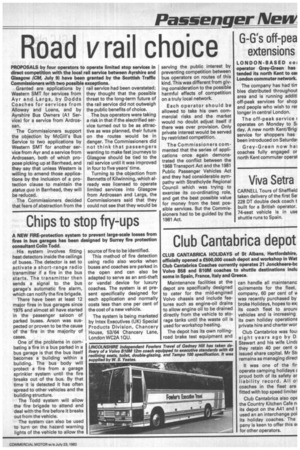Road v rail choice
Page 17

If you've noticed an error in this article please click here to report it so we can fix it.
PROPOSALS by four operators to direct competition with the local r
Glasgow (CM, July 9) have been Commissioners with two possible Granted are applications by Western SMT for services from Ayr and Largs, by Dodds Coaches for services from Alloway and Loans, and by Ayrshire Bus Owners (Al Service) for a service from Ardrossan.
The Commissioners support the objection by McGill's Bus Service to two applications by Western SMT for another service from Ayr and a service from Ardrossan, both of which propose picking up at Barrhead, and they say that unless Western is willing to amend those applications by the inclusion of a protection clause to maintain the status quo in Barrhead, they will be reduced.
The Commissioners decided that fears of abstraction from the operate limited stop services in ail service between Ayrshire and granted by the Scottish Traffic exceptions.
rail service had been overstated; they thought that the possible threat to the long-term future of the rail service did not outweigh the public benefits of choice.
The bus operators were taking a risk in that if the electrified service turned out to be as attractive as was planned, their future on the routes would be in danger. The Commissioners did not think that passengers wanting to make fast journeys to Glasgow should be tied to the rail service until it was improved in four to five years' time.
Turning to the objection from Bennetts of Kilwinning, which already was licensed to operate limited services into Glasgow from Ardrossan and Largs, the Commissioners said that they could not see that they would be serving the public interest by preventing competition between bus operators on routes of this kind. This was different from giving consideration to the possible harmful effects of competition on a truly local network.
Each operator should be allowed to take his own commercial risks and the market would no doubt adjust itself if there was over provision. Only private interest would be served by restricted competition.
The Commissioners commented that the series of applications once again demonstrated the conflict between the 1968 Transport Act and the 1981 Public Passenger Vehicles Act and they had considerable sympathy with Strathclyde Regional Council which was trying to exercise its co-ordinating role, and get the best possible value for money from the best possible services. But the Commissioners had to be guided by the 1981 Act.




















































































